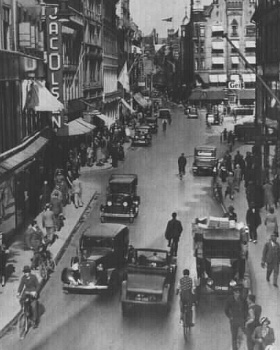The Climate Pitfalls of Denmark’s Electric Car Parking Perk
Outside of China, only two cities of more than a million people are known to have a bicycling mode-share over 30 percent: Amsterdam and Copenhagen. As Rutgers urban expert John Pucher has documented, cycling’s vibrantly high percentage of urban trips throughout Denmark, the Netherlands and Germany was not the product of amorphous cultural factors. Rather, it came about through public policies that not only made cycling safe and convenient but also made driving costly and cumbersome.

So it was disconcerting to learn that one of these measures — limiting the supply and raising the price of central-city car parking — is about to be compromised in Copenhagen. And the announcement could not be more ill-timed, with the Danish capital set to host the U.N. Climate Change Conference starting Monday.
The government of Denmark this week unveiled a package of incentives to jump-start the sale and use of electric cars. As the New York Times reported on Wednesday, each new electric car comes not just with a per-purchase subsidy of $40,000, but with this stunning perk: free parking in downtown Copenhagen.
Free parking, as UCLA Professor Don Shoup has taught us, comes with a high cost: greater car use. The more valuable and pricey the parking space, the greater the inducement to drive when it is given away. In the case of downtown Copenhagen, where parking probably goes for the U.S. equivalent of $25 a day, the inducement will be powerful indeed.
Consider a resident of metropolitan Copenhagen headed downtown from, say, 10 miles away. Even with petrol taxed to a price of $8 a gallon, the fuel cost of the 20-mile round-trip in a 32 mpg car is just five bucks. That’s pocket change next to the $25 parking cost. But make parking free, and the $30 car trip can now be made for $5. Econometric models using price-elasticity suggest that the number of trips will roughly triple as a result — at least until the resulting traffic chokes off some of the increase.
Granted, the parking subsidy applies only to electric cars, so for a while the surge might remain a trickle. But once put in place, subsidies are hard to withdraw. Eventually, the increase in use of electric cars for commuting and other trips into the heart of Copenhagen will take mode share from cycling, walking and transit — not just directly due to the subsidy for driving, but indirectly because those “green modes” will have become less efficient, less safe, and less valued by society.
But perhaps the most jarring aspect of the new policy is the way the national government is cloaking it in green.
As the Times reported:
“We want to be a test and laboratory country for electric cars, hybrid cars and other new technology,” said Lars Barfoed, the Danish minister of transport. “And as host of the climate change conference, that’s made us feel responsible and want to show the world we can do something.”
“Doing something” apparently refers to supplying the battery-charging stations with kilowatts generated by wind turbines, which now account for a world-beating 20 percent of the nation’s electricity. While effective use of wind power is a big carbon plus, subsidizing electric car use could easily end as a net negative if it pushes the travel mix to more car use and undermines Copenhagen’s urban vitality.
Denmark and Copenhagen are hardly alone in being blinded by alternate-fuel vehicles’ green halo. The 2007 Bloomberg congestion pricing plan specified a two-thirds discount for “clean-fuel” trucks, despite the dwindling air quality advantage as cleaner diesel fuels and engines are phased in anyway, and in seeming denial of the additional traffic congestion (as well as reduced toll revenues to support transit).
The veteran energy and transportation specialist Lee Schipper wrote recently in a related context:
Creating a zero-carbon car for China tomorrow won’t solve the much bigger problems of urban congestion, traffic fatalities and the paving over of once-beautiful cities to make room for more cars. The discussions should back up. Energy is only a means to an end. What are the ends, urban access and mobility, or cars for a small minority?
Wise words for Danes and Americans alike.